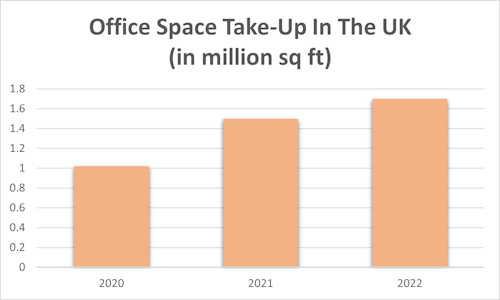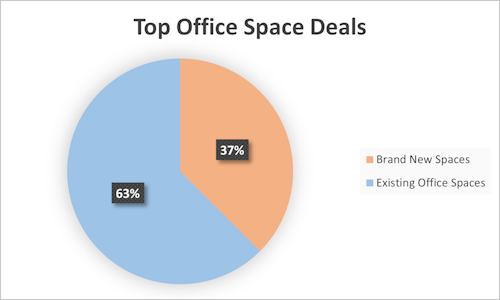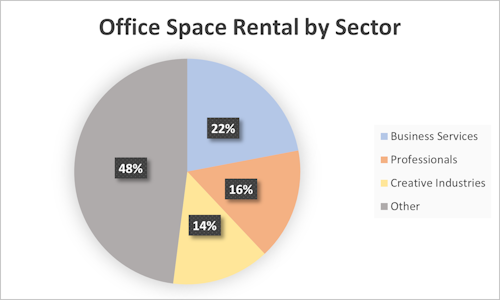Office Space Rental in London: Market Report (2022)
In the two years since the coronavirus pandemic appeared, businesses in London and across the UK have been adopting more agile operational strategies.
According to McKinsey and Company, organisations that embrace agile business models benefit from a 30% increase in customer satisfaction, employee engagement and operational performance.
Alongside the key market trends, demand for London office space rental in 2022 was strong, with many organisations opting for centrally located, amenity-rich workspaces.
Central London Office Take-Up in 2022
The supply of office stock in Central London rose throughout 2022. Our data demonstrates that office supply in the capital increased to 26 m sq. ft. in Q4 (representing a quarter-on-quarter increase of 2.2%). The supply of London serviced offices was up 2.8%.
Central London office supply in 2022 was much higher than the 10-year quarterly average of 16.5 m sq. ft. Q3 saw a marked increase in newly completed offices, which soared by 21% on the previous quarter.
Our data shows that new office supply accounted for 17% of available space in Q4 of 2022.
It’s easy to understand why so many new offices are opening. Following a turbulent two years and a hiatus from the workspace, businesses are ready to get back into the office. However, to entice and keep employees, the ‘new’ office must be worth commuting to.
The Boutique Workplace Company’s new amenity-rich workspace in the West End is one such example. Located next to the operator’s existing freehold 128 Wigmore Street, it was the fourth property the flexible workspace provider opened in 2022.
UK Regional Cities Office Take-Up in 2022
Demand for offices is on the rise elsewhere too. Our data also delves into office take-up in the following UK markets:
- Aberdeen
- Belfast
- Birmingham
- Bristol
- Edinburgh
- Glasgow
- Leeds
- Liverpool
- Manchester
- Southampton
Office demand in these key UK markets grew and take-up totalled 1.7m sq. ft. in Q4 2022, representing a 12.5% increase on 2021 and a 40% increase on 2020.

Again, there is a clear appetite for high-quality space, with new or early marketed space representing nine out of fifteen of the year’s top deals.

In terms of sectors, Business Services had the biggest share of office take-up in 2022 (22%), followed by the Professional Sector (16%) and Creative industries (14%).

Further research at FreeOfficeFinder reveals a promising upward trend for offices too. The data shows that despite the challenges posed by the pandemic, office take-up grew between 2018–2022 (155%), in comparison to 2013–2017 (132%).
Manchester, Bristol and Leeds were among the UK’s top office space growth markets in 2022. In Manchester 427,000 sq. ft. of office deals completed in the city centre in Q4.
This brought annual transactions to 1.2m sq. ft., according to Manchester Office Agents Forum. This is 15% higher than the 1m sq. ft. take-up in 2021.
An Emphasis on Quality Over Quantity
The desire for premium and Grade A office space is being driven by the dynamics of hybrid working; employees are more likely to accept a return to the office if the office can provide comfort in an atmosphere that is also conducive to productivity and wellness.
The collective move towards best-in-class office space is also being strengthened by the shift. towards greener business practices. Environmentally conscious B-Corp offices can help organisations fulfil their ESG goals as they move towards net zero.
BE Offices and Second Home are examples of B-Corp offices known for their commitment to environmental sustainability.
According to data in a 2022 Q4 report by Colliers, Grade A office space - a term that is used to describe office space built to the highest specifications - accounted for 40% of transactions. Clearly, occupiers want to future-proof their relocation decisions.
Predictions for the Office Market in 2023
Moving into 2023, we expect to see hybrid working plateau - or even decline. We also expect to see a growth in the number of coworking spaces opening their doors, and an increased take-up in managed office space by larger organisations.
Meanwhile, the need for environmentally conscious solutions will continue to soar.
1. Decline in hybrid working
Throughout 2021, the world witnessed a collective move towards hybrid working, with desk-based individuals working in the office on a part-time basis and at home (or a third space) for the remainder of the week.
Although hybrid working is here to stay, a growing number of companies - both large and small - are switching to full-time office work again. Some business leaders argue that people are more productive in an office environment; spaces that are designed to support comfort and encourage both learning and collaboration.
2. Expansion of coworking spaces
With further economic turbulence around the corner, some organisations may opt for coworking over leased solutions in 2023. Coworking has been growing in popularity over the last few years; in times of uncertainty, flexible office models (like monthly coworking memberships) become more appealing.
3. Increased take-up of tailored space
Alongside coworking, we expect to see a higher demand for tailored spaces for larger organisations - those who are exiting their lease, for instance.
Known in the industry as managed offices, these flexible workspaces provide some of the services associated with serviced offices yet can accommodate many people.
Rental periods can be longer to provide businesses with more security, however, the fit-out and furnishing can be managed by the operator.
4. More environmentally friendly practices
As we move ever closer to 2030 and the country’s net zero targets, we expect to see an increase in the number of office landlords and operators adopting environmentally friendly practices.
As well as driving down the carbon footprint of the built environment, this will improve the health and wellbeing of employees.
Examples of sustainable practices being adopted by offices are green energy solutions (such as solar panels), the use of sustainable and locally sourced building materials, and recycling policies.